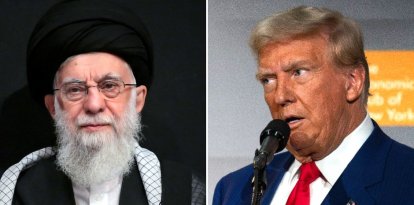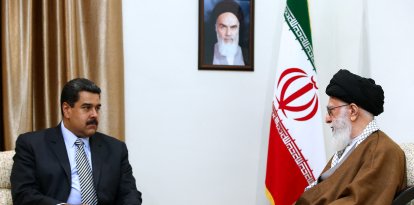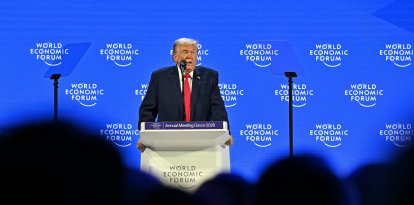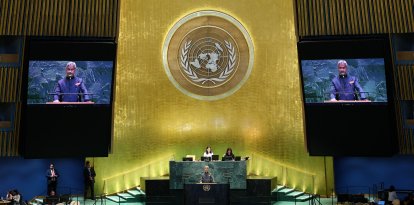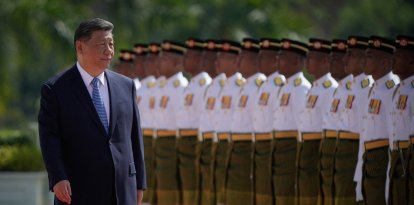Bolivia, or the guide to 'staging' a coup: Tragedy, then comedy, and now a total circus
Staged uprisings are going to be repeated as long as the international community keeps falling for them. It will keep succumbing to these bait and switch tactics because it either does not or cannot learn, nor is it willing to take on the Chavistas at their own game

Military in the streets during the dubious coup d'état in Bolivia.
Last Wednesday, the world got déjà vu. Military and tanks advanced through a main Latin American square, approaching a presidential headquarters in what looked like a tangled comedy, a caricature of any banana republic of the '70s. The distressing scenes came from Bolivia, where President Luis Arce took to the internet in his dramatic appeal to the free world for support amidst a coup d'état taking place in his country. The incident was confusing, so much so that between the rows of troops, ice cream carts were seen, people were taking pictures and reporters were interviewing the leader of the uprising like someone chatting with an actor on the red carpet. The coup had all the ingredients of a staged event, including its duration. It was short, very short, barely enough for the leader of the coup, former military Commander Juan José Zúñiga, to show up at the Presidential Palace and have a bizarre face-to-face discussion with President Arce. Face to face, Arce and Zúñiga, old and close friends, exchanged some very measured and widely televised lines. The president said, "I am your captain, and I order you to withdraw your soldiers. I will not allow this insubordination," and the insubordinate, along with his "army" of fellow insubordinates, set off on their retreat without further ado. End of story.
If this sounds like a bad script, what came next was much worse. Zúñiga, a military commander without merit for his position and whose verbal skills are comparable to those of a dull child, had been removed from his position a few hours earlier for reasons that are not entirely clear. After his 15 minutes of fame, Zúñiga, who had quietly left the scene, was arrested and taken into police custody. Minutes later, Arce spoke to the new Bolivian Army, Navy and Air Force chiefs, by coincidence, already dressed up and ready, and even had prepared some words alluding to their assumption. The newly appointed army chief, José Wilson Sánchez, said that "nobody wants the images we are seeing in the streets" that "stained the uniform" and immediately ordered all the mobilized troops to return to their units. The coup d'état narrative was crumbling by leaps and bounds, falling into an accelerated slope of ridicule when the arrested general concluded the farce by saying before dozens of cameras that it had all been a plan by Arce: "The president told me: 'The situation is very screwed up, very critical. It is necessary to prepare something to raise my popularity.'"
In the short time that the events of Wednesday afternoon lasted, the leaders of the ruling party, Movimiento Al Socialismo (MAS), were dispatched with messages of support for the institutions and repudiation of the coup, or so called by President Arce. Representatives of the political opposition such as Jeanine Áñez, Luis Fernando Camacho, Carlos Mesa or Jorge Quiroga also spoke out against the incident and called to "defend democracy" and defeat MAS at the polls in 2025. And of course, leaders and politicians from all over the region and the world followed the chorus of indignant uncritical defenders of a "democracy" full of political prisoners, institutional degradation and corruption en masse. Nothing mattered, it seemed, like a race to see who could post their uncritical political correctness first and loudest. But when the curtains were pulled back on President Arce's poorly scripted and badly acted cartoon, it was Evo Morales, Arce's mentor and predecessor, who claimed: "President Luis Arce deceived and lied to the Bolivian people and to the world. It is regrettable that such a sensitive issue as the denunciation of a coup is used. Faced with this reality, I must apologize to the international community for the alarm generated and thank them for their solidarity with our country. It is important that a complete and independent investigation demonstrates the truth of this fact."
El presidente Luis Arce engañó y mintió al pueblo boliviano y al mundo. Es lamentable que se use un tema tan sensible como la denuncia de un golpe.
— Evo Morales Ayma (@evoespueblo) June 30, 2024
Frente a esa realidad, debo pedir disculpas a la comunidad internacional por la alarma generada y agradecer por su solidaridad con…
The coup plot had been exposed by a few analysts, journalists and politicians, but as the hours went by, the truth was already well known, and it was evident that the international community had been swindled. It is remarkable how the world still retains the trauma of the military coups of the Cold War, when these have not taken place for decades, and yet does not know how to recognize the way in which third-world tyrants use this resource to legitimize and victimize themselves and gain centrality. Chavez, Castillo and Evo Morales himself have resorted to this tool in the most obvious and crude ways. They are like the fable of "The Boy Who Cried Wolf," only that in this case, the sobering consequence never comes. The world is more foolish and dented than these ridiculous banana autocrats.
The point is that Morales and Arce are locked in a power dispute within the same political space. The opposition has been imprisoned, threatened and disarticulated. The bidding is not based on political ideology, but on who gets the throne, and both characters are seeking support for themselves and disgrace for their former ally. That brawl has paralyzed the government, unable to cope with the growing economic and social debacle. Staged uprisings are going to be repeated as long as the international community keeps falling for them. It will keep succumbing to these bait and switch tactics because it either does not or cannot learn, nor is it willing to take on the Chavistas at their own game. If a character as bizarre as Zúñiga can fool the stable cast of global powers, it is because the world's leaders do not have the judgment or the courage to call a spade a spade. They are all slaves to the narrative of the foolish and delusional left.
The self-coup was the way a flat, ridiculous, immoral and incapable political class found to resolve the tensions that have been brewing in Bolivia for the last few years. Bolivians have been undergoing a marked change with respect to the previous decade taking into account that, in the years rising prices of commodities, when the socialism of the 21st century was installed in the continent, the country's economy grew notoriously. But the cycle of growth was followed by the abyss of the financial crisis and the dictatorial anti-cooperation measures that ended up ruining the Bolivian economy. Arce had been Minister of Finance during that period of strong growth under the orders of President Evo Morales, and it was Morales who took him under his wing, as Rafael Correa tutored Lenin Moreno or Cristina Kirchner tutored Alberto Fernandez. Chavismo does not shine for its originality, and sometimes the puppets want to have a life of their own. Upon assuming the presidency in 2020, Arce found himself with a socially and economically exhausted country, struggling to prevail in an environment in which his former boss has a lot of residual power. With this desperation as a backdrop, President Arce has been exposed in a crude maneuver of express victimization that only convinced the gullible and further amplified political tensions.
Bolivian lawmaker Luciana Campero Chávez pointed out that the so-called coup d'état was an "intention by Arce to improve his image" because of the economic crisis. "It is really shameful how far the MAS government can take the entire Bolivian citizenry," he expressed. "After analyzing the situation closely, we have seen that this was a show put on by Luis Arce, it was a very soft self-coup attempt. With this, it was very evident Arce's intention to improve his image, which was in decline due to the economic crisis we are experiencing in my country. Commander Zúñiga responds only and exclusively to Mr. Luis Arce Catacora. This has been prepared a week ago, since we have the presence of 80 Venezuelan troops in the country who have entered Bolivia without the permission of the Plurinational Legislative Assembly, that is, the Parliament."
Campero Chávez lamented that the move had alarmed citizens and politicians in the region: "Besides, the commander was the one who surrendered to the police, in front of the media." She quoted José Zúñiga himself: "On Sunday, the president told me that the situation is very screwed up and that this week is going to be critical. It is necessary to prepare to raise my popularity." When asked why Zúñiga would accept Arce's request at the risk of going to prison, the congresswoman answers that the he "was No. 47 in his entire military class. That is to say, he did not even have the condition to assume as general commander of the Bolivian Army. A No. 47 never becomes the general commander of the Army, that has been a favor issued by the Arce government. Secondly, unfortunately, everything in Bolivia is about unfair perks."
The legislator suspects that the deal was that Zúñiga could escape from the country and that Arce has not fulfilled that part, because "when Zúñiga left the plaza with the military, the car he was in was going at [3 miles per hour], that is, a person was walking faster than the vehicle. Besides, there was not a single policeman behind the vehicle. What kind of coup d'état was this? It was all so bizarre and so strange that the president faced it, but without police protection, when there are thousands of doors through which the police could have entered the Palacio Quemado."
Political analyst and journalist Emilio Martínez Cardona said: "This seemed like a staging, a script. At the end of the show, which lasted more or less the same as a long movie, General Zúñiga confessed what many of us had been sniffing for a while before: that what had happened was kick-started by President Arce himself, who had asked [Zúñiga] a few nights before to mobilize the tanks, to do something to raise his popularity." Martínez Cardona assures that "it is very possible that Zúñiga has overacted or overplayed his role, or that he did not know that the end of the comedy included his civil sacrifice. Now, Arce has been served a new narrative that will help him to change the axis of the national discussion, at least temporarily, from the increasingly acute economic crisis to the thesis of a 'democracy-defending' government that, unlike the government of Evo Morales, 'did not run from the coup.'"
Bolivia has had dozens of coup attempts and political and social conflicts around successive governments since its independence. It is a repetitive mechanism that has not stopped over the years. Evo Morales starred in one when he unconstitutionally ran for a third term, which unleashed massive protests that caused 36 deaths and led Morales to resign and flee the country under the protection of like-minded governments. The interim government of Jeanine Áñez was later accused of a coup d'état by Morales' MAS, which unjustly imprisoned her. Arce, Morales' handpicked successor, has imprisoned dissidents mercilessly, as a good student of the Chavista socialists that put him in power. But now, Evo wants to return, and Arce is not willing to leave. This is the battle for the 2025 presidential race, which unleashed the drama that the world witnessed last Wednesday.
The consequences are serious, as Emilio Martínez Cardona points out. "The affair may have negative consequences for the rest of the political system, taking into account that, when the tanks were crossing Plaza Murillo, General Zúñiga spoke of 'freeing political prisoners such as Añez and Camacho,' the imprisoned former president and governor, in what could have been an attempt to link them to the military movement. If this does not activate new judicial persecutions against opponents, it will certainly be used to disqualify any threat of political or simply sectorial protests, which will be accused of being a coup or destabilizing." The move may seem textbook, but even though it is increasingly degraded, it still works. The so-called coup was tragedy, then comedy, and now it is a total circus.














